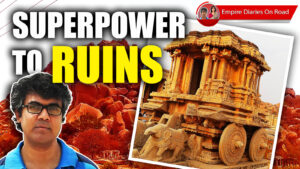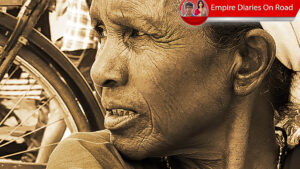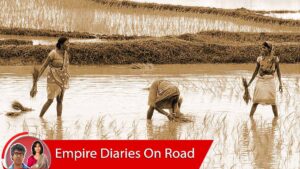March 10, 2023: Tomorrow marks three years since the coronavirus disease was declared a pandemic by the WHO (World Health Organisation) on March 11, 2020. Over the course of this turbulent period, a growing number of questions have been raised by medical experts, activists, and critical-thinking people in relation to the Covid-19 narrative.
The questions that critical-thinking people have been asking about the handling of the pandemic cover a wide range of subjects and issues. The topics include the need for hard lockdowns, the origin of the Covid-19 virus, the media’s role in spreading fear, the vaccine mandates, the mask mandates, other restrictions such as physical distancing, the politicising of decisions at the WHO, and many more.
Empire Diaries spoke with a number of subject-matter experts and asked them what some of the important questions are that they would like the WHO to answer to the public. This article is the first of a series of questionnaire sets that we are publishing. The series starts today with some thought-provoking questions asked by Dr. Amitav Banerjee.
Dr. Banerjee is a clinical epidemiologist, professor, and Head of Community Medicine at Dr. DY Patil Medical College in Pune. The critical-thinking medical veteran has over two decades of experience in the Indian Army as a field epidemiologist. He led the Mobile Epidemic Investigation Team at the Armed Forces Medical College in Pune from 2000-2004, when he investigated outbreaks.
QUESTIONS FOR THE W.H.O:
- If the Covid-19 virus is of animal origin, why have no animals been found in and around Wuhan to harbour the virus or its progenitor?
- If the WHO could not persuade one country, China, to share adequate data on the origin of the virus, what moral right does it have to propose a pandemic treaty that will give the world body enormous powers and undermine the autonomy of democracies around the world?
- With appreciable funding being received by the WHO from private players, leading to conflicts of interest, is it ethical for it to propose a pandemic treaty?
- Regarding the handling of the monkeypox fiasco, which happened during the Covid-19 pandemic, why did the WHO’s director-general overrule standard advice and declare it a global health emergency?
- What are the exact credentials of Dr. Tedros Ghebreyesus, the current WHO director-general? Does he have training as a medical doctor and professional authority to overrule his advisers in declaring monkeypox as a global health emergency?
- Can we trust the WHO when important decisions are taken on the whims and fancies of one person at the top, such as declaring a public health emergency for any trivial infection?
- Why has the WHO kept the precise definition of the word ‘pandemic’ elusive? A pandemic was understood classically as an infection that kills the young and healthy in large numbers. Covid-19 is impacting mostly the old and the unhealthy with hardly any impact on the young. Should it have been called a pandemic?
- Why was the definition of ‘cases’ in this pandemic based on positive RT-PCR tests in people who showed no symptoms of the disease?
- So many viruses and bacteria are present in healthy persons but do not cause any symptoms, and no attempt is made to isolate them from healthy people. Why was an exception made for Covid-19?
- Why was the cause of death attributed to Covid-19 on the basis of a positive RT-PCR test even when a person died from other comorbidities, such as a gunshot wound, in one such reported instance?
- Did the WHO carry out a cost-benefit studies of restrictive measures such as lockdowns and business closures?
- Studies by individual researchers have established the immense collateral harm of lockdown policies. In view of this, why has the WHO not yet issued a statement ruling out such restrictive measures in future?
- Why did the WHO downplay immunity after recovery from natural infection with the novel coronavirus even after studies established that such immunity is more robust than vaccine-derived protection?
- All the Covid-19 vaccines first came under the EUA (emergency-use authorisation) and were experimental. On the basis of what evidence did the WHO prematurely endorse the slogan ‘Nobody is safe, until everyone is safe’? It amounts to propaganda for mass vaccination that eliminates the control group that is essential for evaluating an experimental intervention.
- How does the WHO explain that African countries, which have the lowest rates of vaccination rates compared to other parts of the world, are showing the lowest morbidity and mortality from Covid-19?
- What is the definitive evidence for recommending booster shots against Covid-19?
- How does the WHO define ‘misinformation’? Science is ever-evolving and any contrary viewpoint today may be the correct and accepted viewpoint tomorrow with the accumulation of more evidence. How can one categorically define ‘infodemic’ in light of the evolving nature of science?
- It was a well-known fact that once community transmission is established, contact-tracing has no impact. It has been confirmed by recent studies as well. So, why did the WHO continue to insist on the model of ‘test, trace, isolate’ throughout the pandemic?
- Are Covid-19 vaccines effective? The WHO kept on assuring that they are. How does the WHO explain the surges in coronavirus cases and deaths even after mass vaccination in many countries?
- Are the Covid-19 vaccines safe? How does the WHO explain the excess mortality in many countries after roll-out of mass vaccination?
- Why was research on repurposed drugs such as HCQ (hydroxychloroquine) and Ivermectin for early pre-hospital treatment sabotaged and not encouraged?
REPUBLISHING TERMS:
All rights to this content are reserved. If you want to republish this content in any form, in part or in full, please contact us at writetoempirediaries@gmail.com.









